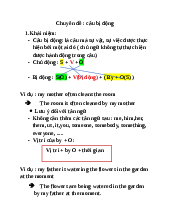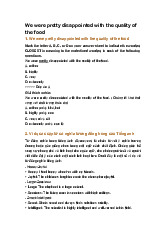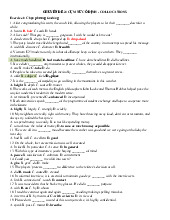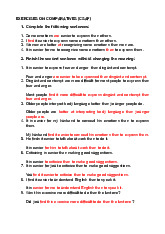







Preview text:
TAG QUESTION
1. Định nghĩa và cấu trúc
Câu hỏi đuôi là một câu hỏi ngắn được thêm vào cuối câu và được ngăn cách bằng dấu phây.
Nếu động từ ở phần chính ở thể khẳng định thì ở phần đuôi là phủ định và ngược lại.
S + V..., trợ động từ (auxiliary) + S (pronoun)? (+) → (-) (-) → (+) E.g:
- He can swim, can't he? (Anh ấy có thể bơi, phải không?)
- Mr Nam doesn't buy that house, does he? (Ông Nam không mua căn nhà đó, phải không?) 2. Cách sử dụng
- Nếu phần hỏi đuôi lên giọng ở cuối câu (rising intonation) thì đó thực sự là một câu hỏi vì người nói chưa biết câu trả lời.
- Nếu phần hỏi đuôi xuống giọng ở cuối câu (falling intonation) thì đó là hình thức xác nhận lại thông
tin, chứ không phải là một câu hỏi thực sự vì người nói đã biết câu trả lời và mong người nghe đồng ý.
Lời nói khẳng định thì luôn có phần hỏi đuôi ở dạng phủ định, và câu trả lời cho câu hỏi dạng này là
"Yes". Lời nói phủ định thì luôn có phần hỏi đuôi ờ dạng khẳng định, và trả lời cho câu hỏi dạng này là "No". E.g:
You are a teacher, aren't you? Yes, I am.
You don't live here, do you? No, I don't.
3. Các trường hợp đặc biệt
Một số trường hợp đặc biệt chúng ta cần lưu ý: a. I am...., aren't I? b. Let's V.., shall we?
c. Câu mệnh lệnh khẳng định thì phần hỏi đuôi là "will/ could/ would/ won't you"; câu mệnh lệnh phủ
định thì phần hỏi đuôi là "will you".
d. Khi chủ ngữ là “this/that”, thì phần hỏi đuôi ta dùng đại từ "it".
E.g: This is a book, isn't it?
e. Khi chủ ngữ là these, those thì phần hỏi đuôi ta dùng "they".
f. Khi chủ ngữ là there, phần hỏi đuôi ta vẫn dùng "there".
g. Khi chủ ngữ là những đại từ bất định như: anyone, anybody, no one, nobody, everybody, everyone,
somebody, someone thì chúng ta dùng đại từ "they" làm chủ ngữ trong câu hỏi đuôi. E.g:
- Everyone is going to the museum, aren't they?
- There is no one in the class, are there? (vì trước là no one nên dùng khẳng định ở phía sau)
h. Khi chủ ngữ là những đại từ bất định như everything, something, anything, nothing thì chúng ta
dùng đại từ "it" làm chủ từ trong câu hỏi đuôi.
i. Khi mệnh đề chính có cấu trúc: "I+ think/believe/suppose/......" + mệnh đề phụ thì ta dùng động từ
trong mệnh đề phụ để xác định động từ cho câu hỏi đuôi.
E.g: I think she will meet him, won't she?
Cũng mẫu cấu trúc này nhưng nếu chủ từ không phải là "I" thì dùng động từ chính trong câu (think/
believe/ suppose/ ...) để xác định động từ cho câu hỏi đuôi.
E.g: She thinks he will come, doesn't she?
j. Khi câu đầu sử dụng động từ "had better", ta mượn trợ động từ "had" để lập câu hỏi đuôi; Khi câu
đầu sử dụng động từ "would rather", ta mượn trợ động từ "would" để lập câu hỏi đuôi. CONDITIONAL SENTENCES TYPE 0
Câu điều kiện loại 0 được dùng để nói về các phát biểu khoa học hiển nhiên đúng hoăc những sự việc luôn luôn đúng.
Form: If + S + V (present tense), S + V (present simple)
Chúng ta có thể dùng when / if trong loại câu điều kiện này.
E.g: If you heat water to 100 degrees, it boils. (Nếu bạn đun nước đến 100 độ thì nó sôi.)
Có thể dùng cấu trúc mệnh lệnh trong mệnh đề kết quả thì ta dùng động từ nguyên mẫu không có to.
E.g: If you feel tired, please take a short rest.
BÀI TẬPVẬN DỤNG CƠ BẢN
Bài 1: Choose the best answer.
1. You're coming to France with us, ? A. aren't you B. isn't you C. shouldn't you
2. It wasn't very late, ? A. wasn't it B. isn't it C. was it
3. Mark's buying something for his mother, ? A. wasn't he B. isn't he C. was he
4. It won't be anything cheap, ? A. won't it B. isn't it C. will it
5. There's some cheese in the fridge, ? A. isn't there B. isn't it C. wasn't it
6. We don't need to go buy any bread today, ? A. don't we B. do I C. do we
7. Linda can bring some chocolate, ? A. won't she B. will she C. can't she
8. The concert starts at eight o'clock, ? A. isn't it B. doesn't it C. does it
9. The movie was very boring, ? A. isn't it B. wasn't it C. was it
10. There's a red book on the shelf, ? A. isn't it B. isn't there C. aren't there
11. There's a lot of noise in the street, ? A. aren't there B. isn't there C. is there
12. Mrs. Brown is sick, ? A. isn't she B. is she C. wasn't she
13. The glasses are dirty, ? A. weren't they B. isn't they C. aren't they
14.Tom won't be at the meetinq, ? A. won't he B. isn't he C. will he
15. The French exam was very easy, ? A. wasn't it B. isn't it C. weren't they
16. We can go on holiday on Friday, ? A. won't we B. can we C. can't we 17. I'm late, ? A. isn't I B. aren't I C. are I
18. This jacket is too big for me, ? A. isn't it B. doesn't it C. does it
19. Emily plays the piano well, ? A. isn't it B. does she C. doesn't she
20. Your cousins went on holiday, ? A. isn't they B. didn't they C. aren't they
Bài 2: Complete the questions by adding the tag questions.
1. Minh doesn't like football, ?
2. You haven't done your homework, ?
3. You sat next to Mai, ? 4. Your name is Na, ?
5. I didn't leave my wallet on the desk ?
Bài 3: Complete the sentences with the correct question tags.
1. She is collecting stamps, ?
2. We often watch TV in the afternoon, ?
3. You have cleaned your bike, ?
4. John and Mike don't like English, ?
5. Peter played handball yesterday, ?
6. They are going home from school, ?
7. Mary didn't do her homework last Monday, ?
8. He could have bought a new car, ?
9. Mark will come tonight, ? 10. I'm clever, ?
11. John smokes a lot, ?
12. My mother has lovely hair, ?
13. You do like this film we're watching, ?
14. He can't speak English very well, ?
15. Your brother isn't married, ?
16. She doesn't cook very well, ?
17. We can go to the cinema tomorrow if you want, ?
18. They don't have a very nice house, ?
19. She is the richest woman in the town, ?
20. We should leave before it gets dark, ?
21. You'd like a cup of tea, ?
22. They mustn't go too near the lake, ?
23. You'll see John tomorrow, ?
24. We won't be going to that restaurant again,?
25. Let's try and phone her again, ?
26. You've seen this film already, ?
27. Your uncle has never been out of the village, ?
28. You're seeing Elizabeth next week,
29. I'm not speaking first at the meeting, ?
30. This was an interesting exercise, ?
■ BÀI TẬP VẬN DỤNG CƠ BẢN
Bài 4: Complete the zero conditional sentences with the verb in brackets. Use contractions where possible.
1. If you press that button, the light (come) on.
2. It's easier to sleep if (you / not / be) stressed.
3. The teacher gets angry if (we / not I work) hard.
4. If (I / go) on a boat, I always feel sick.
5. His mother gets annoyed if (he/ be) late.
6. If (I / not / know) a word, I look in my dictionary.
7. They play football if (they / not / have) any homework.
8. If you freeze water, (it / turn) to ice.
Bài 5: Complete the sentences using the words from the box case doesn't don't soon unless until will won't 1. Bob
be upset if you don't invite him to your party.
2. We'll stay in the park it gets dark.
3. The organizers will announce the winners as as the race has finished.
4. We always go out for a walk at the weekend it rains. 5. They pass unless they study more.
6. You'll get cold if you wear a coat.
7. If Nancy drinks too much coffee, she sleep at night.
8. We're taking some sandwiches in the children don't like the food.
Bài 6: Combine each pair of sentences to make one sentence using the Conditional Type 0.
1. You heat water to 100 degrees. It boils.
2. It rains. The grass gets wet.
3. Plants don't get enough water and sunlight. They often die.
4. My mother doesn't sleep well. She drinks coffee before bed.
5. The menu appears on the screen. You press this button.
Bài 7: Match the two halves to make a complete sentence. A B
1. If we don't feel well,
a. if you cross an international date line.
2. If plants don't get enough water,
b. if you drop it on the floor. 3. We easily get tired
c. if you heat it to 100 degrees. 4. We become ill
d. if you drop it in water. 5. The cup breaks
e. if she eats too much chocolate. 6. If iron gets wet,
f. if we eat dirty food.
7. My daughter gets sick g. they die. 8. Water boils h. we see a doctor. 9. Ice floats
i. if we work under the sun. 10. The time changes j. it rusts.
Bài 8: Underline the mistakes and correct them.
1. If you not pay on time, you have to pay a fine.
2. If you never showered, you are sweaty and smelly.
3. If you park your caron double yellow lines, your car would be pulled away.
4. If you weren't at home, you can collect your parcel at the post-office.
5. If you will delete an email, it stays in your trash for 30 days.
6. Normally, you would be charged late fees if you return your car late.
7. Please, read what happens if you cancelled your booking.
8. I don't have any breakfast if I overslept.
9. Find out what you can do if you will travel without a ticket.
10. I always take my umbrella if it rained.
Bài 9: Make complete sentences using the conditional type 0.
1. (I / wake up late /I / be late for work)
2. (my husband / cook / he / burn the food)
3. (Julia I not wear a hat / she / get sunstroke)
4. (children / not eat well / they / not be healthy)
5. (you / mix water and electricity / you I get a shock)
6. (people / eat / too many sweets / they / get fat)
7. (you / smoke / you / get yellow fingers)
8. (children / play outside / they / not get overweight)
9. (you / heat ice / it / melt)
10. (I / speak to John / he / get annoyed)
BÀI TẬP TỔNG HỢP NÂNG CAO
Bài 10: Choose the underlined part that needs correction.
1. (A) You don't know (B) the answer, (C) are (D) you?
2. He doesn't (A) need a (B) furnished (C) apartment, (D) doe sn't he ?
3. He (A) can (B) play (C) the guitar, can he?
4. The movers (A) are not (B) packing the book (C) for us, (D) a ren't t hey ?
5. I (A) am a (B) new member in (C) this group, (D) am not I?
Bài 11: Choose the best answer.
1. No one is better at English than Lan, ? A. is she B. isn't she C. are they D. aren't they
2. There are a lot of people attending the wedding party, ? A. are they B. are there C. aren't they D. aren't there
3. He seldom goes to the park, ? A. doesn't he B. is he C. does he D. isn't he 4. Let's go for walk, ? A. will we B. shall we C. don't you D. do you
5. I think he will come here, ? A. doesn't he B. won't he C. will he D. don't I
6. The film is boring, ? A. is it B. are they C. isn't it D. aren't they
7. You are listening to music ? A. is you B. are you C. aren't you D. were you
8. He can speak English, ? A. can he B. can't he C. can't him D. could he
9. You don't know her, ? A. do you B. don't you C. are you D. aren't you
10. Nga speaks English very well, ? A. does she B. doesn't she C. is she D. was she
11. John has bought a dictionary, ? A. does he B. did he C. has he D. hasn't he
12. They met him at the party last night, ? A. do they B. don't they C. did they D. didn't they
13. They are going to do the test tomorrow, ? A. do they B. are they C. aren't they D. did they 14. I'm short; ? A. am not I B. aren't you C. are you D. aren't I
15. No one is in this room now, ? A. is one B. isn't one C. is he D. are they
Bài 12: Choose the best answer in brackets to complete the sentences.
1. If I go to bed after midnight, I (am always/ ‘ll always be/ would always be) tired in the morning.
2. I (will/won't/wouldn't) tell you anything if you don't keep a secret.
3. If he spoke good English, he (finds/ will find/ would find) a good job in this city.
4. I (don't/ won't/ wouldn't) trust these people if I were you.
5. Tim (comes/ will come/ would come) to see you tomorrow if you take these tablets.
6. If plants don't have enough water, they (die/ will die/ would die).
Bài 13: Put the verbs into the correct form (the zero conditional, the first conditional or the second conditional).
1. If you (not be) careful, you'll burn yourself. .
2. Would you go to see the headmaster if they (start) bullying you again? .
3. I (not lend) him any money even if I had some. .
4. If he (have) a choice, he always chooses ice cream for pudding. .
5. I would be so happy if he (ask) me out. .
6. If you heat ice, it (turn) to water. .
7. What will you do if she (decide) not to come after all? .
8. It's very simple, son: if you (not behave) properly, you don't get your treat. .
9. Would you know what to do if you (lose) your passport on holiday abroad? .
10. If Tim invites me to his party, I (not accept) his invitation. .
Document Outline
- S + V..., trợ động từ (auxiliary) + S (pronoun)?
- (+) → (-)
- 2. Cách sử dụng
- E.g:
- 3. Các trường hợp đặc biệt
- a. I am. , aren't I?
- CONDITIONAL SENTENCES TYPE 0
- Form: If + S + V (present tense), S + V (present simple)
- BÀI TẬPVẬN DỤNG CƠ BẢN
- Bài 2: Complete the questions by adding the tag questions.
- Bài 3: Complete the sentences with the correct question tags.
- Bài 4: Complete the zero conditional sentences with the verb in brackets. Use contractions where possible.
- Bài 5: Complete the sentences using the words from the box
- Bài 6: Combine each pair of sentences to make one sentence using the Conditional Type 0.
- Bài 7: Match the two halves to make a complete sentence.
- Bài 9: Make complete sentences using the conditional type 0.
- BÀI TẬP TỔNG HỢP NÂNG CAO
- Bài 11: Choose the best answer.
- Bài 12: Choose the best answer in brackets to complete the sentences.
- Bài 13: Put the verbs into the correct form (the zero conditional, the first conditional or the second conditional).



